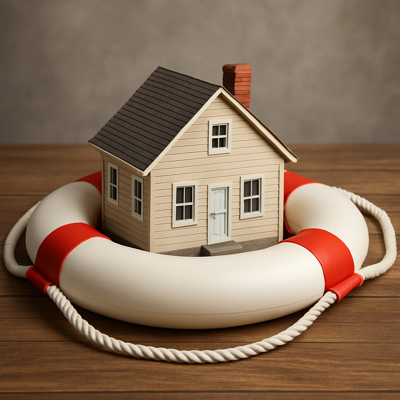Illinois homes are vulnerable to a range of natural hazards, including flooding, earthquakes, and severe weather. Assessing a home’s disaster readiness is key to reducing potential damage and ensuring the safety of those who live there. The following guide outlines steps to evaluate and improve a home’s resilience against these risks.
1. Identify local hazards & flood risks
Flooding is one of Illinois' most significant risks, but it's often preventable with proper precautions. Start by reviewing FEMA flood maps at the Flood Map Service Center (FEMA.gov) to see if your property lies within a floodplain or floodway. The Illinois Flood Maps website can also offer valuable, property-specific information. If you're unsure, contact your local building, planning, or engineering department to learn more about historical flooding patterns in your area.
Floodproofing a home may include elevating utilities, sealing basement walls, installing a sump pump, and using check valves to block sewage from backing up. A check valve is a one-way device installed in sewer or drain lines that allows wastewater to exit the home while preventing it from flowing back in during storms or floods. This helps keep sewage and stormwater from entering through sinks, toilets, or drains. Good drainage, clear gutters, and temporary barriers, such as sandbags, also help reduce the risk of flooding. In high-risk areas, raising the entire home may be the most effective way to protect both the structure and its occupants.
2. Assess your home’s structural integrity
Illinois has recently adopted the International Building Code (IBC) and the International Residential Code (IRC), which establish the standard for structural resilience. To ensure a home meets current building codes, it may be necessary to hire a licensed structural engineer for a thorough inspection, particularly if past events may have affected its stability. A basic self-assessment can also help identify concerns by looking for signs such as foundation cracks, roof leaks, or utility issues that could become more serious during a disaster.
To identify potential structural issues, inspect the foundation, walls, and ceilings for cracks, particularly if they’re widening. Doors or windows that stick, uneven floors, and visible roof issues may point to underlying structural concerns. Keep an eye out for separation near chimneys or porches and consider calling in an expert if something doesn’t look right.
General home strengthening also plays a crucial role. Ensure that doors, windows, and the roof are in good condition to withstand various weather events, such as high winds or heavy snowfall.
3. Review your insurance coverage
While most homeowners' insurance policies cover basic damages, they typically exclude coverage for flooding, earthquakes, or ground sinking caused by mining. To ensure complete protection, contact the insurer to discuss adding additional coverage for these specific risks.
4. Prepare for emergencies
Every Illinois home should have an emergency plan in place. Designate a meeting spot and ensure an emergency kit is stocked with essentials for at least three days. Include water, food, medications, and a weather radio. Don’t forget to consider your pets' needs as well.
Stay informed about local disaster risks and take advantage of resources like Ready Illinois, which offers valuable information on preparing for various emergencies.
For a broader understanding of natural hazards, use FEMA's National Risk Index, which provides insights into your community’s overall vulnerability to disasters.
Taking these steps helps safeguard an Illinois home against the unexpected, providing greater peace of mind regardless of what nature may bring.








(0) comments
Welcome to the discussion.
Log In
Keep it Clean. Please avoid obscene, vulgar, lewd, racist or sexually-oriented language.
PLEASE TURN OFF YOUR CAPS LOCK.
Don't Threaten. Threats of harming another person will not be tolerated.
Be Truthful. Don't knowingly lie about anyone or anything.
Be Nice. No racism, sexism or any sort of -ism that is degrading to another person.
Be Proactive. Use the 'Report' link on each comment to let us know of abusive posts.
Share with Us. We'd love to hear eyewitness accounts, the history behind an article.